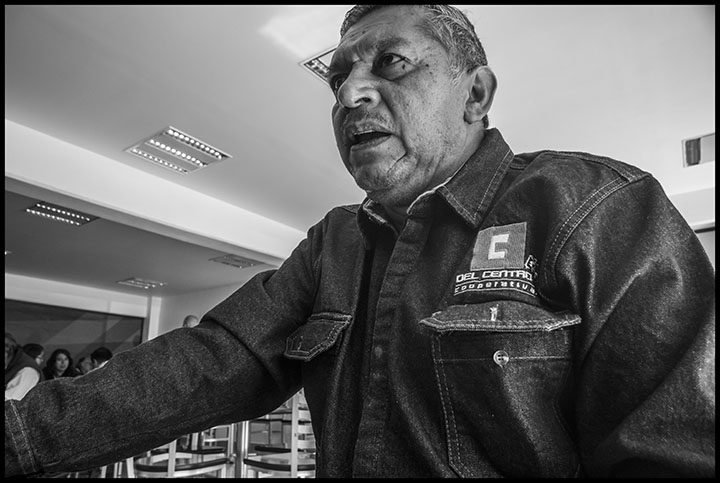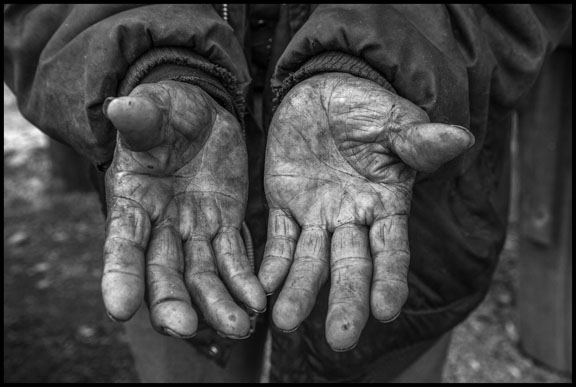The Hamas-run Health Ministry in Gaza said on Saturday that 107 people were killed over the past 24 hours, bringing the wartime total to 27,238, with more than 66,000 people have been wounded.
Scotland Yard estimated around 10,000 demonstrators had marched through the West End of London on Saturday, with the crowd doubling to 20,000 for the speeches in Whitehall.
Demonstrators carried banners which read “end the killing” that were accompanied by harrowing images of the bloodshed since the conflicted erupted.
Other banners declared “free the children”, “freedom to Palestine” and “Boycott Israel”.
At least 200,000 people marched for Palestine in London on Saturday, a sign of the continuing mass anger against Israel’s genocidal assault in Gaza. Some speakers at the march rally said it was 250,000.
At the same time around 10,000 people were on the streets in Edinburgh (see below). It was the biggest march in the city since the start of the Israeli assault on Gaza.
In London, Amara, a young Muslim woman from Tower Hamlets, told Socialist Worker, “Israel needs to give Palestine its land back. And those who were forced to leave Palestine have to be allowed back.
“Just like the British Empire was forced to give land back—the Israeli state has to do the same. It’s not theirs to keep.”
Marchers chanted, “Rishi Sunak you can’t hide, we charge you with genocide,” and, “Keir Starmer, you can’t hide, you support a genocide.”
Farah, who lives in London but is from Iraq, said, “I have no words for what Israel is doing except genocide. But I’m not shocked at the response from the West, or Arab leaders. They care about their own interests.”
Safa and Meenal from west London said, “Cutting Unrwa aid funding is unacceptable and the accusations against it are bullshit—respect to Spain for actually upping their funding. The labelling of Houthis as terrorists is ridiculous—the British and US armies are two of the world’s biggest terrorist organisations.
“Police trying to scare people into silence and off the streets won’t work. We know what we’re standing for, everyone protesting today is on the right side of history.”
Sophie from Northampton said, “In Yemen the Houthis are standing up for what’s right, Britain needs to stop bombing them.”
The police were noticeably more aggressive than previously on the demonstration. They had issued a ban on face coverings—a studied insult to Muslim women—in advance. They arrested a protester for this at one point.
And later they pushed into the Socialist Worker Student Society (SWSS) section of the march, seized the lead banner with its slogan, “Victory to the resistance”—but then returned it.
There were at least 31 trade union banners in the special section of the march, and many others sprinkled throughout the rest of the demonstration.
The workplace and student day of action on Wednesday, 7 February, is now a chance to deepen the movement among workers and students. Pete from King’s College London UCU union branch said, “We need more direct action targeted at the arms industry.”
On 7 February, he said, “We are doing a staff and student lunchtime walkout for Palestine.”
Thousands of people gathered in France, Switzerland, and Germany on Saturday to call for an immediate ceasefire in Gaza.
In Paris, hundreds of protesters, carrying Palestinian and South African flags, denounced the ongoing Israeli attacks on Gaza. Criticising the French president for “complicity” in Israel’s attacks on Palestinians, the protesters urged the government to work towards peace in the Middle East.
In Geneva, thousands marched through the city centre in support of the people of Gaza. In Berlin, 2,000 Palestinian supporters rallied at Potsdamer Platz against the attacks.
More rallies are planned across the world on Sunday to call for an end to the war that has seen more than 27,000 Palestinians killed by Israeli attacks on Gaza since October 7.
The United States has conducted a wave of air strikes on Iran-aligned targets in Iraq and Syria in retaliation for an attack that killed American soldiers in Jordan.
On Saturday, Iraq said 16 people, including civilians, were killed on its soil, and a monitoring group reported 18 people were killed in Syria.
In all, the US government claims that they struck 85 targets in Iraq and Syria. At RUDAW, Julian Bechocha reports on the Iraqi reaction:
“The Ministry of Foreign Affairs will summon the charge d’affaires of the US Embassy in Baghdad, David Burger, in protest against the American aggression that targeted Iraqi military and civilian sites,” the ministry said in a statement.
The US on Friday night launched a major retaliation campaign against the Islamic Revolutionary Guard Corps-Quds Force (IRGC-QF) and Iran-aligned militias in Iraq and Syria, striking more than 85 targets with over 125 precision munitions. The strikes killed at least 16 people and injured 25 more in Iraq’s western Anbar province, near the Syrian border, according to the Iraqi government.
Iraq’s presidency condemned the strikes as a “blatant violation of Iraqi sovereignty,” saying it will hold an emergency meeting of the country’s four presidencies and political blocs “to discuss the aggression.”
“Iraq has expressed a clear desire to organize the work of the international coalition through a round of talks, but yesterday’s attacks will undermine the chances of success of the ongoing negotiations,” it said.
We put a question to the National Security Council spokesperson, John Kirby, on Friday on how targets [following the air strikes in Iraq and Syria] were selected.
We were told there was clear and irrefutable evidence that these were linked to attacks on US interests. When asked if we could see this evidence, none was provided. When we asked if this evidence would be forthcoming, we were told that we would just have to trust the US military.
You’ll remember that we were told to trust the US military back in 2003, prior to the US invasion of Iraq. And that intelligence turned out to be faulty.
This time around, the US military is promising to be more transparent.












